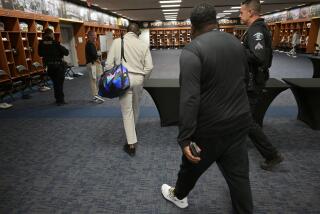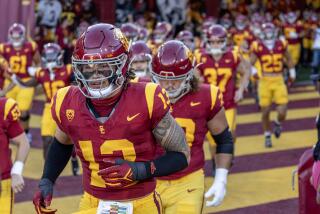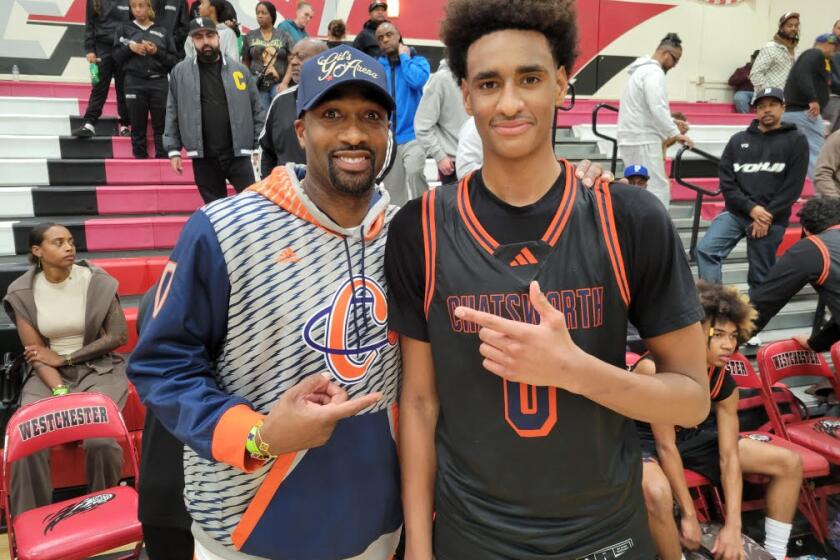Religion, Football Don’t Mix, ACLU Says
BOULDER, Colo. — Switching to the wishbone was Bill McCartney’s idea. After three years of futility and only seven victories, the University of Colorado football coach might have been expected to make a few changes.
Some other changes in the CU program were not McCartney’s idea: No longer will he ask his players to bow their heads in silent prayer before the Buffaloes take the field; no longer will he ask players to say grace before team meals; no longer will he share his faith while speaking to civic groups in his capacity as coach.
Those changes, instituted under pressure from the American Civil Liberties Union, may be more subtle, but they are no less controversial. In the wake of negotiations initiated by the ACLU, CU has issued a five-point reaffirmation of basic rules separating religion from the athletic program. More specifically, the guidelines are designed to keep McCartney’s personal faith--he has described himself as a “born-again Catholic”--from influencing his football policies.
Although prayer has long been a part of football at public and parochial universities, the joint policy reaffirmation by CU and the ACLU will curtail it on the Boulder campus.
“It’s really no different than the way they’re doing it in a hundred different universities across the country,” McCartney said. “I guess my feeling is that what we’ve been doing is really totally within the framework of what would be expected. We’re not really doing anything to be investigated for. From that standpoint I don’t really see a need for all this. I don’t see that it’s that big a deal.”
Some students and faculty disagreed. Complaints about the overlapping of football and religion followed closely a similar complaint from CU’s department of pharmacology and controversy over a motion to make prayer mandatory at commencement exercises. Hence ACLU staff counselor David Miller was moved to call the university “a hotbed of potential constitutional litigation.
“It’s amazing what a group of administrators and regents can do when set loose on the Constitution,” Miller added. “The image of Boulder as an enlightened community certainly doesn’t carry over to the university.”
A story last December in the Boulder Camera by reporter Janet Wiscombe set forth McCartney’s strong Christian beliefs and quoted some players who speculated that those beliefs might have a bearing on the way McCartney ran the team. Jill Hanauer, a 24-year-old political science major, subsequently fielded a handful of complaints from faculty and classmates expressing opposition to any organized religious practices at a state university.
When her negotiations with university officials stalled, Hanauer called in the ACLU, which negotiated the policy statement released after meetings with CU legal counsel Ted Ayres, Athletic Director Bill Marolt and McCartney.
“Basically,” McCartney said, “I recognize in issues like this I have a responsibility not to impose my feelings on those around me. And I haven’t really imposed my faith on anyone. I’m not interested in creating any controversy.”
Neither is Marolt, who declined to comment beyond the university’s one-page policy statement. Attorney Judd Golden, who handled the negotiations for the ACLU, said McCartney cooperated fully, which made for an outwardly amicable and tidy resolution. At first, Golden said, both McCartney and Marolt dismissed the quoted player protests as coming from complainers, a contention that has found support among players who date the rumblings from a frustrating, season-ending loss to Kansas State last year. Consequently, the ACLU approached the negotiations by simply addressing those practices the coach acknowledged.
According to Golden, McCartney said he conducted prayers during coaches’ meetings, asked the offensive and defensive captains to lead prayers before team meals, instituted pregame prayer and closed speeches to civic groups and clubs with devotional material.
“All those things come from the coach’s mouth and are certainly First Amendment violations,” said Golden. “That’s not the way things should go in public institutions.”
Part of the ACLU’s concern stemmed from religious beliefs expressed by McCartney while speaking in public as a representative of the university. One player, senior receiver Loy Alexander, said he heard complaints from fellow students who had listened to McCartney speak in dorms, fraternity houses or even classes, expecting to hear about CU football.
“I think some students were disappointed they didn’t hear about football, but about his religious beliefs,” said Alexander. “I never attended any of those talks, but that’s what I heard.”
Although religion has knelt on football’s periphery for years, only about 10 CU football players belong to the Fellowship of Christian Athletes, according to FCA regional field representative and former CU assistant coach Dan Stavely. Stavely, who worked under several head coaches between 1963 and 1982, said religion hasn’t been a factor in McCartney’s choice of assistants or in determing playing time.
“That’s a bunch of hogwash,” he said. “Mac is a good Christian, there’s no question where his heart is. But when he was filling some openings he called me and we talked about some guys and (religion) didn’t even come up. As for players, I don’t think if Mac’s life depended on it he could tell you the Christians from the non-Christians.”
Dempsey and three unnamed assistants also were cited for discussing their religious faith with students at a summer football camp where participants were asked to “close their eyes and raise their hands if they want to redirect their lives.”
On CU game days, informal and voluntary services were made available to players with McCartney’s approval. According to Steve Vogel, who quarterbacked the Buffs last season, about 10 or 12 players attended a Catholic Mass while a non-denominational service drew an even larger crowd. If there is to be pregame chapel this year, the players must initiate it.
Vogel said McCartney occasionally would make Biblical references during practices, but they amounted to nothing more than stories told to illustrate a point: The story of David and Goliath was told more than once as CU struggled last season as perpetual underdogs. Pregame or post-game prayer consisted of taking a knee for a moment of silence. McCartney never led any sort of invocation on those occasions, Vogel said.
Even last season when tight end Ed Reinhardt was seriously injured and lying in a coma, the team assembled after practice, dropped to one knee and joined hands for a moment of silence. “If you didn’t want to say a prayer, then you just tried to think positive about him and hope it transferred to him” said Vogel.
There were some rumblings of dissatisfaction. Alan Braun, a punter on last year’s team, speaks highly of his coach’s spiritual strength, but he wasn’t deaf to complaints of some teammates.
“There were people talking bad about it,” he said. “Some people felt he played favorites with it. It was the guys who weren’t playing who said it: ‘This isn’t fair, I’m not religious so he’s not playing me.”’
Whether the idea of religious favoritism was real or merely a benchwarmer’s rationalization, there has been no indication that it ever seeped into recruiting, at least not intentionally.
“Because of the way he incorporated his religion, I thought it might affect a player’s decision to come here,” said Alexander. “Coach McCartney had his beliefs and he told them to you. He expressed his strong belief in Jesus Christ, but that was as far as it went with me. I thought with all the bad rumors about it, it might have an effect on recruiting, that guys would think if you’re not a religious guy, you don’t fit in here.”
Does the religion in the locker room issue really have a resolution?
“As long as I’ve played, it’s been in my life,” added Alexander. “I believe in Jesus Christ myself. That’s always been a part of my game. It’ll forever be a part of football. It comes from the way you’re raised. No matter what’s said or done or who makes the rules, it’s going to be there.”
More to Read
Get our high school sports newsletter
Prep Rally is devoted to the SoCal high school sports experience, bringing you scores, stories and a behind-the-scenes look at what makes prep sports so popular.
You may occasionally receive promotional content from the Los Angeles Times.






